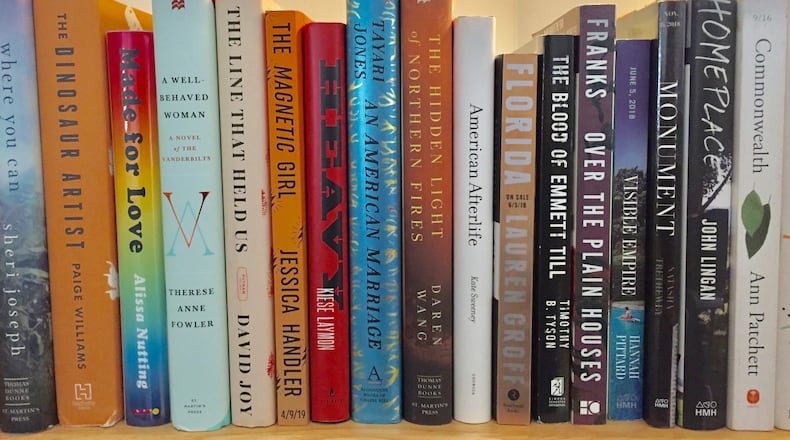Oral storytelling traditions run deep in the South, providing the foundation for some of the region's best literary output. But in Alyson Hagy's "Scribe," a slim, taut novel about human nature and the price we pay for the choices we make in the name of survival, the art of storytelling takes center stage. Not only do characters tell each other stories to illustrate their worldviews, but "Scribe's" overarching narrative takes on the unexpected sheen of a mythological hero's journey.
Authors take a gamble when withholding key information in their stories. If they hold back too much or too long, they risk frustrating their readers. But if they’re skillful about it, they can tease out nuggets of knowledge and build tension in a way that draws readers in and propels them hurtling to the end to see how the hard-earned revelations add up.
“Scribe” falls in the latter category. There are some things that are never revealed, like the name of the woman at the heart of the book or the place where she lives, although we can surmise it’s somewhere in the Blue Ridge Mountains of Virginia, where the author grew up. We also don’t know when the book is set, whether it’s in the future or a reimagined past, but its apocalyptic setting has rendered it void of modern conveniences such as electricity or motorized vehicles.
What we do know is that there has been a civil war followed by a decimating epidemic that together have destroyed the social fabric and replaced it with a desperate lawlessness.
“No one trusted dreams of good fortune. The naivete had ended. And a harder law prevailed: take or be taken.”
The woman at the center of the action is a tough, cynical loner of indeterminate age who has managed to survive by living off the land in her childhood home. In exchange for goods and services, she barters her skill for writing letters using paper and inks she makes from pulpwood and tree bark.
One day a man named Hendricks arrives on her doorstep requesting a letter. Like most of the letters she is asked to write, it is a plea for forgiveness. But in his case, she is asked to memorize the letter and deliver it orally.
“You’ve paid a high price to survive in this world,” Hendricks tells the woman. “You’re as thick-skinned and done-up and alone as anybody I ever met.”
The woman is distrustful of Hendricks and his motivations, especially when she suspects he has knowledge about her dead sister, whose death weighs heavy on her heart for more reasons than one. But she welcomes his company, too, once he fulfills his side of the bargain by killing a mountain lion and bringing her the hide. She considers taking him as a lover and weighs the consequences of intimacy.
“She had made a habit, an ugly habit, of trading unruly human love for payments she could hold tightly in her hands.”
When she finally sets out to write his letter, she falls into a bewitched state.
“She wrote so swiftly she used two full bottles of her richest ink and had to grind and mix powder for the third. Despite her haste, her brushes remained true, especially those tipped with human hair.”
The alliance between the woman and Hendricks sets off a series of tragic events that antagonize the woman’s greedy neighbors and a sprawling camp of homeless pilgrims called the Uninvited, who camp on the edge of her land. They are drawn there to pay homage to her dead sister, who nursed their dying babies during the epidemic and who they believe was divine after a child she cared for inexplicably rallied temporarily before succumbing to the fever.
As for the scribe, the Uninvited suspect she is a witch.
“Her sister had been a healer and a meddler. She, herself, had nothing to offer the world except the recordings of its failures.”
Eventually the woman sets off on a treacherous journey to escape an impending attack and to deliver Hendricks’ letter at a crossroads where he agrees to meet her. Along the way, she strikes an uneasy bargain with self-appointed despot Billy Kingery, a decision she would come to regret if it hadn’t been preordained. The seeds of magical realism planted early on in the book achieve full bloom during the woman’s odyssey. En route, she encounters a mysterious little boy who accompanies her part of the way.
“’Does it feel terrible or wrong?’ the boy asked. ‘What you’re doing?’”
“’I can’t tell,’ she said. ‘It feels like it’s the only choice I have.’”
As “Scribe” marches to its devastating conclusion, the story of the woman’s journey grows tightly braided with the backstory of her sister’s fate and passages from Hendricks’ letter that reveal troubling insights into his motivations.
The foreboding sense of mounting doom that hangs over “Scribe” is so pervasive that when redemption arrives, it astonishes with its uplifting promise of hope and compassion. The trajectory of the story is not altered, but the power of salvation is found in the lessons learned along the way about humanity and what it means to love in a time of utter despair.
FICTION
by Alyson Hagy
Graywolf Press
157 pages, $16
About the Author
Keep Reading
The Latest
Featured




